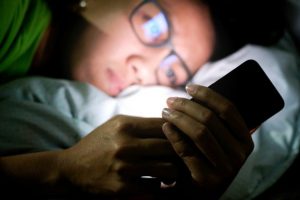For many of us, smartphones are the last thing we use before bed and the first thing we reach for in the morning. However, this can be detrimental to our health because of the blue light that is emitted from smartphone screens. This is problematic as the number of smartphone users is expected to reach up to 2.87 billion by the year 2020.

Phone usage by ShutterShock
How Blue Light Controls our Sleep
Blue light disrupts our circadian rhythm also known as our body’s sleep-wake cycle. Our circadian rhythm is controlled by melatonin, which is influenced by its exposure to light. During the day, visible light from the sun decreases melatonin levels. This reduction in melatonin allows us to stay awake. On the other hand, during the night we aren’t exposed to the same high-energy light from the sun, therefore, this increases melatonin levels and allows us to sleep. However, smartphones contain an artificial blue light that has the same high-energy visible light that we would get during the day. Therefore, using a smartphone before bed can disrupt the sleep cycle because of the decreased amount of melatonin that the body is receiving. In turn, a reduction of melatonin can prevent sleep which will ultimately lead to exhaustion.
Video Credit by Science Insider
The Big Picture
Nonetheless, it is not practical to get rid of our phones in order to protect our eyes from blue light. However, there are a few things we can do to keep our eyes safe as well as our health. A 2018 study concluded that going to bed without having any smartphones in the room improves a person’s quality of sleep. They also suggested that sleeping without smartphones will improve relationships, focus and overall well-being. Another cost-effective solution is to buy a glare-reducing screen cover for your phone that will help prevent sun and light glare.
Overall, as tempting as it may be to scroll through Instagram one last time before bed, is it worth disrupting your body’s natural sleep-wake cycle? Definitely not.
Basima Spindari
